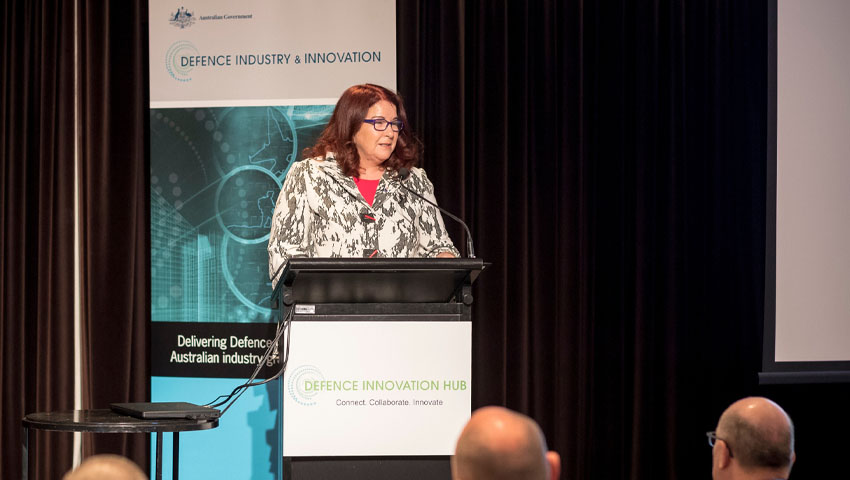Nine Australian businesses have secured defence contracts totalling more than $28 million, Minister for Defence Industry Melissa Price has revealed.
The Defence Innovation Hub has awarded nine contracts worth over $28 million to businesses across Australia, as part of the federal government’s ongoing commitment to invest in local defence capability.
Contracts have been awarded to BlueZone Group ($7.1 million), QinetiQ ($4.8 million), Thales Australia ($3.8 million), Silentium ($3.5 million), Armor Composite Engineering ($3.2 million), Defendtex Research Labs ($2.1 million), Mission Systems ($2.1 million), Prism Systems ($925,000), and Spiral Blue ($640,000).
| Organisation | State | Contract value (GST incl.) | Description of innovation |
| BlueZone Group (UVS) | NSW | $7.1 million | BlueZone group is developing an unmanned surface vehicle that can be integrated into Australia's future frigates, accommodating a range of payloads that could broaden the capabilities of Royal Australian Navy ships by extending their situational awareness while deployed on operations. |
| QinetiQ | ACT | $4.8 million | QinetiQ is developing a new system to help better regulate air quality inside submarines, with the potential to significantly reducing size, weight, and power requirements. |
| Thales Australia | NSW | $3.8 million | Thales is developing its Blue Sentry autonomous sonar system that will seek to expand Australia’s surveillance capabilities in the maritime domain. This system will be integrated with the OCIUS autonomous Bluebottle technology being developed through the Hub. |
| Silentium | SA | $3.5 million | Silentium is continuing to develop its space surveillance passive radar technology. This new contract will allow Silentium to demonstrate a more mature and capable sensor in support of Defence space domain awareness. |
| Armor Composite Engineering | NSW | $3.2 million | ACE is continuing to develop its curved body armour that can be worn by both male and female soldiers. This material has the potential to greatly improve the safety of the wearer by reducing the likelihood of injury from ill-fitting body armour. |
| Defendtex Research Labs | VIC | $2.1 million | Defendtex is developing an enhanced drone platform that can be used across a range of operating environments. This technology has the potential to improve the safety of ADF personnel deployed on operations. |
| Mission Systems | NSW | $2.1 million | Mission Systems is developing its mine neutralisation technology that seeks to enhance the safety of ADF personnel in the maritime domain. |
| Prism Systems | SA | $925,000 | Prism Systems is developing and demonstrating an integrated capability solution for the Royal Australian Navy, which seeks to improve the efficiency and effectiveness of ship and aviation system integration flight trials through automating processes, analysis, recording, and reporting of data. |
| Spiral Blue | NSW | $640,000 | Spiral Blue is developing a satellite imagery processing system capable of monitoring large geographic areas. This system offers great potential for ADF border security and surveillance operations by integrating an artificial intelligence system capable of analysing large amounts of data. |
Minister for Defence Industry Melissa Price said the investments would further support the local defence industry as it grapples with the economic impact of the COVID-19 crisis, particularly SMEs, which have secured approximately 84 per cent of contracts awarded by the Defence Innovation Hub.
“I’m delighted to see the Defence Innovation Hub continuing to provide Australian businesses with opportunities that could enhance Defence capability,” Minister Price said.
NSW-based manufacturer BlueZone Group and ACT-based business QinetiQ have secured contracts from the hub for the second time.
BlueZone’s $7.1 million contract (the second largest contract awarded by the Hub) will be used for the continued development of the Wave Glider unmanned surface vehicle technology, which Minister Price said has the potential to “greatly improve” the Navy’s situational awareness when operating in marine environments.
The $4.8 million in additional funding provided to QinetiQ will be invested in the development of a new system to better regulate air quality in submarines, helping reduce size, weight and power requirements.
“These contracts demonstrate the significant investment the government is making in game-changing maritime technologies for our Navy,” Minister Price added.
The Defence Innovation Hub has now awarded more than $270 million in innovation contracts since launching in December 2016.
Last month, the federal government invested an additional $32 million in the hub to provide further cash flow support to SMEs amid the ongoing COVID-19 crisis.








